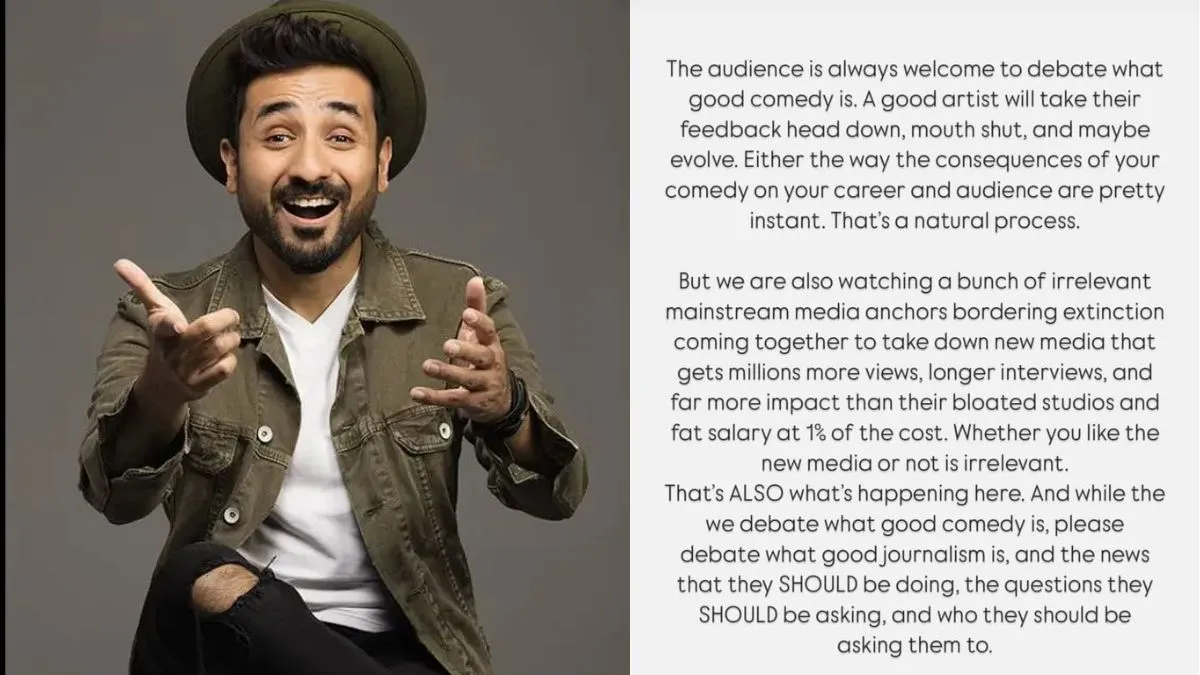 |
|
The recent controversy surrounding Ranveer Allahbadia, a prominent YouTube influencer, has ignited a firestorm of debate, not only regarding the nature of acceptable comedy but also the standards of modern journalism. Actor and comedian Vir Das has weighed in on this multifaceted issue, criticizing what he perceives as an overzealous and ultimately unproductive response from mainstream media outlets. Das's statement, delivered via Instagram Stories, points to a larger conversation surrounding the role of media in shaping public discourse and the accountability of both content creators and journalists. His comments highlight the complex interplay between artistic expression, public reaction, and the responsibility of the press to provide balanced and insightful reporting rather than sensationalized coverage.
Das's critique focuses on the disproportionate attention given to Allahbadia's controversial remarks on a YouTube comedy show. He argues that the relentless coverage by television news channels is not only excessive but also misses an opportunity for more substantive journalistic inquiry. Instead of simply condemning Allahbadia's comments, Das suggests that the media should be exploring deeper issues related to the content's impact, the ethics of online comedy, and the broader implications for influencer culture. This calls for a more critical approach to media consumption, encouraging audiences to question the motivations behind news coverage and to seek out diverse perspectives rather than relying solely on the narratives presented by mainstream outlets. The comedian's observation that these anchors represent a dying breed further emphasizes his point about the need for a more robust and relevant form of journalism.
Beyond the specific case of Allahbadia, Das's statement prompts a broader reflection on the standards and ethics of both comedy and journalism. He acknowledges the ongoing debate about what constitutes ‘good comedy,’ emphasizing that artists must be prepared to receive and learn from criticism. His assertion that a 'good artist' will accept feedback humbly and potentially adapt their work indicates an understanding of the dynamic relationship between creative expression and audience response. However, he argues that the mechanisms for accountability within the world of comedy – primarily through audience reaction and its immediate impact on a performer's career – differ considerably from the world of journalism. While the consequences for a comedian are arguably more immediate and directly related to their actions, journalists also face a high responsibility to ensure their reporting is factual, balanced and does not contribute to the spread of misinformation.
The difference in the nature of accountability for comedians versus journalists is significant. Comedians often face immediate public backlash, impacting their career trajectory and audience engagement. This creates a natural feedback loop for comedians to adapt and refine their work, reflecting on the impact of their performances. Journalists, on the other hand, operate with a greater need for fact-checking, verification and the avoidance of bias. The line between opinion and fact can often be blurred, and the impact of a journalist's work might not always be instantly visible, necessitating a different approach to accountability. While both fields depend on a degree of subjective interpretation, the impact on public perception and the potential for harm require different considerations.
Das's call for a debate on ‘good journalism’ is particularly pertinent given the rise of social media and the proliferation of misinformation. The ease with which biased or factually incorrect information can spread online demands a critical engagement with media narratives, demanding viewers to discern quality reporting from sensationalism and biased reporting. It is important for the media to maintain high standards of integrity in their reporting to fulfill their responsibility to inform the public accurately and objectively. In a media landscape increasingly fragmented and susceptible to partisan influence, Das's intervention highlights the need for more introspective analysis within the journalism profession, a move towards a commitment to truth and thoughtful analysis, and a critical evaluation of the role of media in the age of social media and the proliferation of disinformation.
In conclusion, Vir Das's comments on the Ranveer Allahbadia controversy serve as a timely reminder of the crucial need for self-reflection within both the entertainment and media industries. While the debate over what constitutes ‘good comedy’ continues, Das argues that a parallel conversation is urgently needed regarding the standards and responsibilities of journalism in today's complex media environment. By urging a critical examination of media practices, he underscores the need for responsible reporting, accuracy, and a commitment to balanced information dissemination, ensuring that audiences are well-equipped to navigate the complexities of the modern media landscape.
